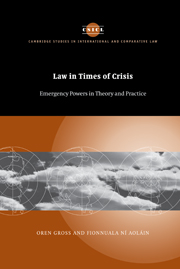Book contents
- Frontmatter
- Contents
- Acknowledgments
- Table of cases
- Table of treaties
- Table of legislation
- Table of international materials
- Introduction
- Part I
- Part II
- 5 International human rights and emergencies
- 6 Emergencies and humanitarian law
- 7 Terrorism, emergencies, and international responses to contemporary threats
- Bibliography
- Index
- CAMBRIDGE STUDIES IN INTERNATIONAL AND COMPARATIVE LAW
5 - International human rights and emergencies
Published online by Cambridge University Press: 03 September 2009
- Frontmatter
- Contents
- Acknowledgments
- Table of cases
- Table of treaties
- Table of legislation
- Table of international materials
- Introduction
- Part I
- Part II
- 5 International human rights and emergencies
- 6 Emergencies and humanitarian law
- 7 Terrorism, emergencies, and international responses to contemporary threats
- Bibliography
- Index
- CAMBRIDGE STUDIES IN INTERNATIONAL AND COMPARATIVE LAW
Summary
This chapter evaluates how international human rights law oversight interfaces and affects the domestic regulation of crisis and where human rights norms regulating the experience of emergencies “fit” within the scheme presented in the first three chapters. In doing so, we examine the interaction between international human rights law and the experience of emergencies at the domestic level. We also offer a critique of the failures of the international system to provide consistent and stringent oversight of state recourse to crisis powers. The consequences of this failure are explored further in chapter 7 where we look at the effects of September 11, 2001 on international and national practices.
International human rights law is a recent legal and political phenomenon, created largely by treaty norms put in place after World War II. The postwar period produced a flurry of aspirational and binding documents and treaties, including the Universal Declaration on Human Rights, the Genocide Convention, the European Convention on Human Rights (hereinafter European Convention), the International Covenant on Civil and Political Rights (ICCPR), and the International Covenant on Economic, Social, and Cultural Rights. Additional regional treaties such as the African (Banjul) Charter on Human and Peoples' Rights (African Charter) and the American Convention on Human Rights (American Convention) were added later on to the international complement of protections. A driving feature of many of these treaties, regional and international, is that they explicitly acknowledge the need to make provision for the experience of crisis.
- Type
- Chapter
- Information
- Law in Times of CrisisEmergency Powers in Theory and Practice, pp. 247 - 325Publisher: Cambridge University PressPrint publication year: 2006

